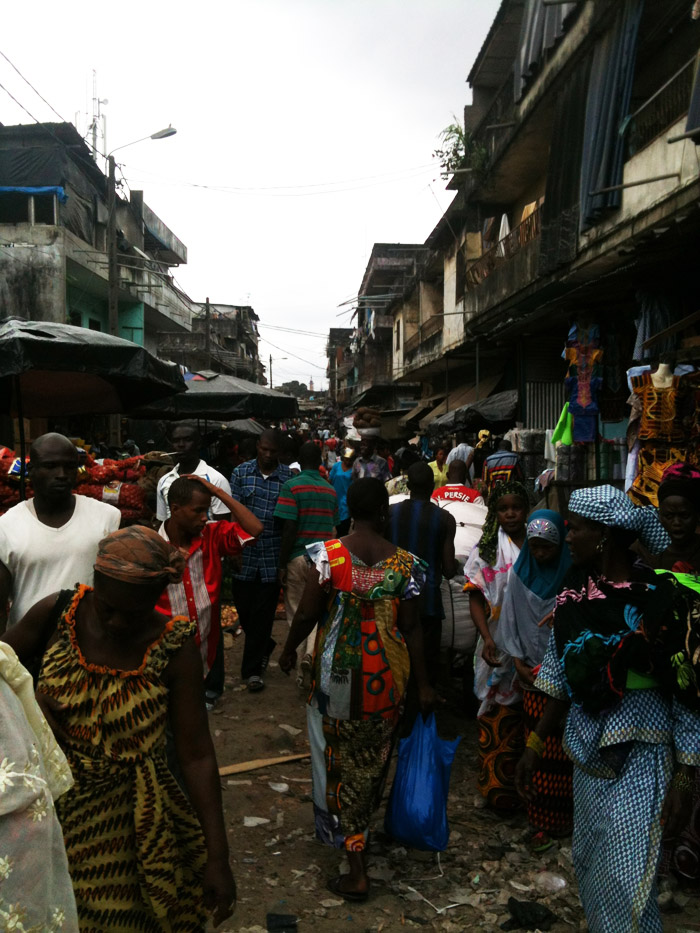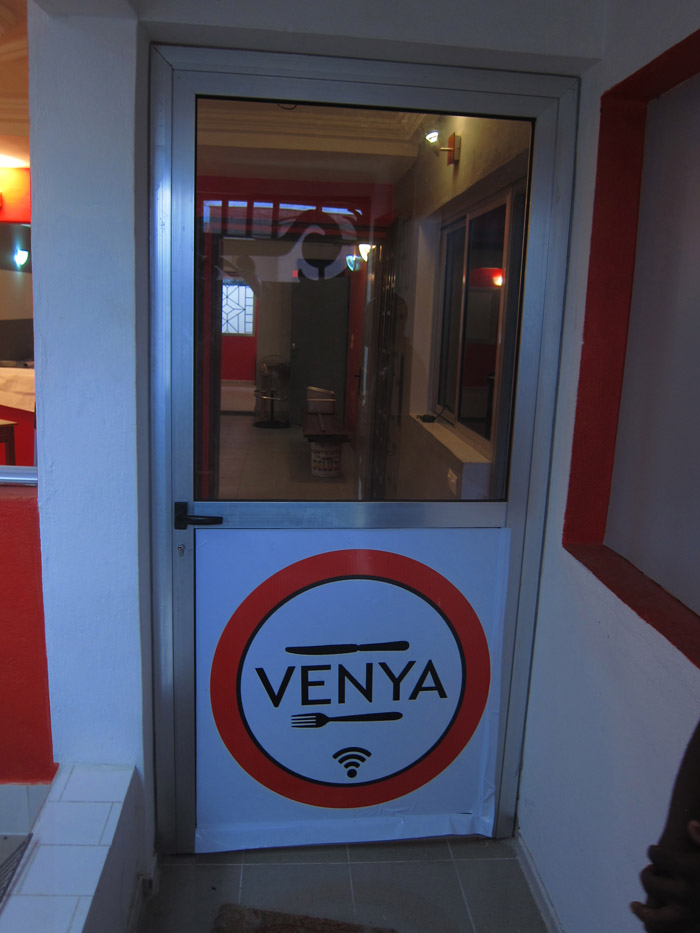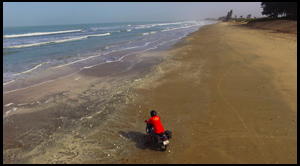If you want to tropicalize yourself (you should do this at some point in your life), Abidjan in August might not be the place to do so. The rainy season lingers, the sky is gray, and cold showers – normally a relief – leave you breathless. As a pale tubabu, I embrace the grayness and the autumnal air. I am from Cleveland, after all. But even I can tire of a city that has lost its color.
Adjame market is one place that resists the Abidjan winter. There is enough kinetic energy and ambient heat in the market to remind you of the tropical latitude. In August, I went to Adjame almost every other day, mostly to source products for our restaurant, which is open for business as of 1 WEEK AGO (well, partially open!). The following narrative is from my last trip to the market. I wrote this a couple of weeks ago, but haven’t been spending much time on the computer recently. I’ve written a personal update at the bottom.
—
You can enter the market by walking from a distance, so that you ease into the current of pedestrian traffic and ambulant vendors, long before the taxis and trucks bully their way into the cramped alleys and the pousse-pousses bear down on you (pousse pousses are push carts laden with too many very heavy things that rarely stop due to their inertia). Or, you can take a gbaka or taxi and get out right in the middle of it. This is what we did.
Ma cherie, ma cherie!! il y en a!! is the first thing we hear. This is another way of saying “Hey my dear!! I have what you are looking for!!” But this vendor was selling clothes hangers and we were looking for a cocktail shaker.
We found the cocktail shaker in a little store near the forum, behind a strip of vegetable sellers. The store was framed by towers of metal bowls and tupperware. Inside, a Lebanese man poked his head through a fortress of rubber washing basins. He greeted us and then went back to his cigarette and his calculator. The store did not offer a pleasant shopping experience. It smelled like aged plastic and mildew and wherever there wasn’t merchandise there were arrhythmic blinking christmas lights. The Lebanese merchant was a great conversationalist, though, and after living in Abidjan for 17 years he could speak full-on nouchi (a form of Ivorian slang I guess you could say). We bought the cocktail shaker and noted the prices for serving trays and soup bowls.
Outside the store, we walked along a black crease darkened by charcoal residue. For a moment you feel like you’re walking on air, but you’re actually walking on trash. The ground in this stretch of the market is always saturated. Water pools in the discarded plastic bags that are layered beneath your feet and the surface remains wet long after it rains. It is even more unpleasant than the interior of the rubber washing basin shop.
But everything is better at our next stop, the fabric vendors. The ground here is not layered with water sachets, but with a million tiny slivers of fabric, pieces of patterns everywhere. We are received by Issa, a gigantic man with a shaved head and bushy sideburns. Issa somehow has a voice that reminds me of Joe Pesci. His girth reminds me of Cheick, one of the bouncers at the Badalabougou Bamako nightclub Jet7, which sadly closed its doors right before Ramadan this year. Cheick gave out bear hugs and when he played pool, balls exploded off the table with every shot. I hope he has found a new job.
Issa sweet talked us into buying fabric at his stand. Over 10 meters of black, orange and white fabric that will become the uniforms for our servers. When we began our negotiations, Issa dipped his head and laughed as if our price was unheard of. After 10 minutes of joking around, he agreed to an amount that was 1000 cfa (or $2) above the price we originally requested. And that 10 minute conversation is the joy of shopping at Adjame, or any other market in West Africa.
We made several more purchases after Issa’s fabric stand, but the most important one was a brochette sandwich. These are not like the Sahelian brochettes with their heavenly oversized morsels of beef. Abidjan street-side brochettes are minuscule, but they are well-spiced and tender and they cost 5 cents a pop. The brochette vendor will grab a handful of brochettes, turning them over the coals a few times before sliding them off into a sliced baguette. And then the best part, he will set the bread on the grill for a moment, lightly toasting it before you dig in.
For dessert, I opted for a fresh coconut. In front of the coconut push cart a Gbaka apprentike and driver argued with a woman selling baby clothes. The Gbaka had tipped over her wares and they didn’t seem very apologetic about it. Coconut water spilled down my shirt as I watched the palabre (literally palaver aka “prolonged idle discussion,” but it can be a bit more than that in Abidjan). Most of the time, palabres are great entertainment. The insults are creative and the tension rises and falls with each joke. Ivorian humor is tops in the region if you ask me.
With all of our baggage in hand, we flagged down a taxi to head back to Angre. Full speed ahead through the final gauntlet of vendors, trucks, gbakas, pedestrians, push carts and motos. The chauffeur wore a blazer over his tshirt and had one of those oversized knobs on the steering wheel. And as he navigated through the traffic, his whole body lurched with each jerk of the wheel. From the backseat, it looked like he was dancing to the Serge Beynaud track on the radio. Windows down, that perfect early evening Abidjan air, and our dancing driver. Yes, Abidjan est plus doux que Paris.
Personal update
It’s been over a month since my last post, the longest stretch of silence since I started this blog. The explanation is simple: we are launching a restaurant, which is infinitely more involved than our lunch delivery/catering business that we operated out of yopougon. We are allllllmmmoooost there. The full service is not quite ready to go, but everything is going in the right direction and we are just about at the finish line. Or the starting line depending on how you look at it. While the “sur place” is not fully operational, we’ve opened the take-away counter and we’ve accepted a number of clients in the first dining room.
We’ve done almost nothing to advertise in the neighborhood and we have not yet held the all out launch, but the word is getting around. There is almost nowhere to eat around this intersection in Angre and people are pressed to have a solid restaurant that is consistent and affordable. We are blessed with an incredible staff, most importantly Michelle aka Michou the head chef who absolutely kills it in the kitchen and we couldn’t be more excited about the coming days. More to come in the next post.






I’m very proud of you, phil. I really appreciate the efforts you make to improve your business. The way you are taking life easy impresses me a lot. Could you tell me where the restaurant is located in angre? i live in the neighbourhood and i would greatly appreciate to come and say hello to u one of these days…and taste Michou’s meal of course!
Thanks! I will send you an email with the exact location, but we are Angre 8eme tranche 🙂
I always enjoy when you take us on a journey through everyday scenes in West Africa. Congrats on your restaurant!